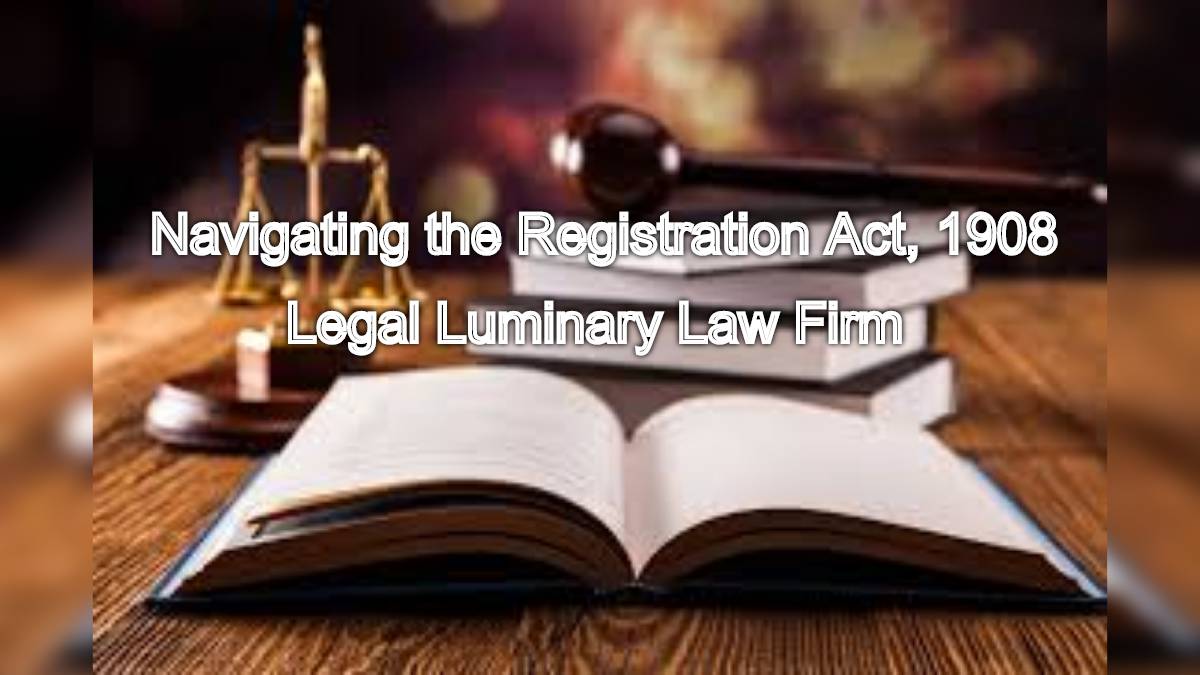Ensuring Authenticity: Navigating the Registration Act, 1908
Ensuring Authenticity:
Navigating the Registration Act, 1908: In India, the real estate market thrives, and commercial ventures flourish. However, amidst this dynamic landscape, ensuring the authenticity and legality of transactions is paramount. Here at Legal Luminary Law Firm, a leading legal entity, we understand the importance of upholding transparency and safeguarding your interests. This article serves as a comprehensive guide, navigating you through the intricacies of the Registration Act, 1908, a cornerstone of property and document registration in India.
Safeguarding Your Transactions: A Guide to the Registration Act, 1908 with Legal Luminary Law Firm
Understanding the Registration Act, 1908: The Bedrock of Secure Transactions
The Registration Act, 1908, stands as a pivotal piece of legislation in India. It governs the registration of various documents, primarily those related to immovable property, such as sale deeds, mortgages, and gifts. By registering these documents, the Act ensures:
- Public Record: Registration creates a public record, accessible for verification by any interested party. This transparency mitigates the risk of fraudulent transactions and protects your ownership rights.
- Validity: While registration isn’t mandatory for all documents, it strengthens their legal enforceability. A registered document holds greater evidentiary weight in a court of law.
- Priority: The Act establishes a system of priority. Registered documents take precedence over unregistered ones in case of disputes concerning the same property.
What Documents Require Registration Under the Act?
The Registration Act mandates the registration of specific documents to ensure legal validity and public record. These documents encompass:
- Sale Deeds: Documents transferring ownership rights of immovable property, exceeding a specific value set by each state government.
- Gifts: Documents transferring ownership of immovable property without monetary consideration.
- Mortgages: Documents creating a charge on immovable property to secure a loan.
- Leases: Leases exceeding a specific duration, as determined by each state government.
The Registration Process: A Streamlined Approach
The registration process under the Registration Act is designed to be efficient and transparent. Here’s a simplified breakdown of the steps involved:
- Presentation of Documents: The relevant document, duly stamped and signed by the parties involved, is presented at the office of the Sub-Registrar within whose jurisdiction the property lies.
- Verification and Scrutiny: The Sub-Registrar meticulously examines the document for completeness and adherence to legal formalities.
- Payment of Fees: The prescribed registration fee, determined by the value of the property, is paid.
- Endorsement and Registration: Once verified and fees paid, the document is endorsed and registered, creating a permanent record.
Benefits of Registering Documents Under the Act
Registering documents under the Registration Act offers a multitude of benefits, safeguarding your interests and promoting transparency:
- Protection from Fraudulent Transactions: Registration acts as a deterrent against fraudulent property dealings, offering peace of mind to both buyers and sellers.
- Strengthened Legal Claims: Registered documents carry greater weight in court, simplifying the process of enforcing your rights in case of disputes.
- Priority in Disputes: Should ownership conflicts arise, registered documents take precedence, ensuring your rightful claim is upheld.
- Enhanced Marketability: Registered properties are considered more marketable, as potential buyers have greater confidence in the transaction’s legitimacy.
Legal Luminary Law Firm: Your Trusted Partner in Navigation
At Legal Luminary Law Firm, we possess a team of highly qualified lawyers with extensive experience in property law and the Registration Act. We offer comprehensive legal services, including:
- Document Scrutiny: Our meticulous lawyers will thoroughly examine your documents, ensuring they comply with all legal requirements before registration.
- Registration Assistance: We’ll guide you through the entire registration process, ensuring a smooth and efficient experience.
- Dispute Resolution: Should property disputes arise, our skilled lawyers will represent you effectively, upholding your rights.
Frequently Asked Questions (FAQs):
While non-registration doesn’t render the document entirely void, it weakens its legal enforceability. In a dispute, a registered document would prevail.
Registration of a forged document is a criminal offense punishable by law. It’s crucial to ensure the authenticity of documents before registration.
While some states are exploring online registration options, the current process primarily involves physical submission at the Sub-Registrar’s office.
The registration time frame can vary depending on the workload at the Sub-Registrar’s office. However, it generally takes a reasonable time.
Read More
- Property Transactions Simplified: Exploring the Transfer of Property Act, 1882
- Securing Justice: Insights into the Specific Relief Act, 1963
- Unraveling Legal Evidence: Understanding the Indian Evidence Act, 1872
- Navigating Legal Waters: Expertise in Indian Contract Act, 1872
- Code of Civil Procedure (CPC): Expert CPC Legal Services and Attorneys
- Ministry of Law and Justice:

